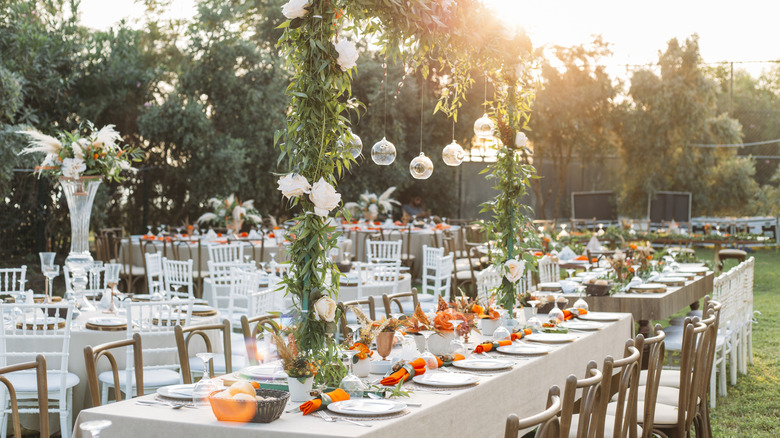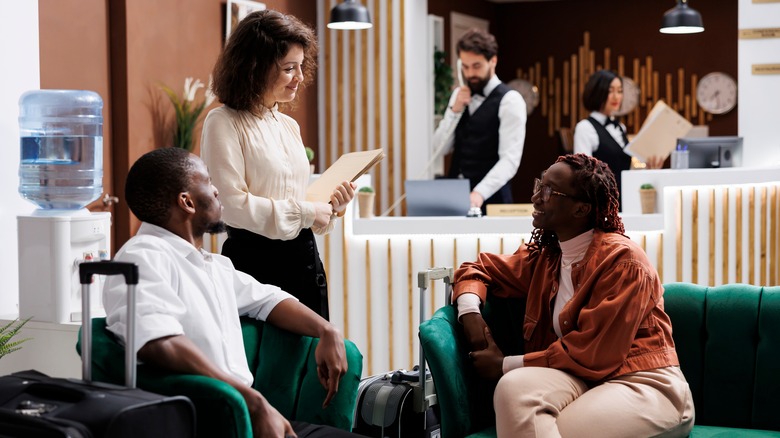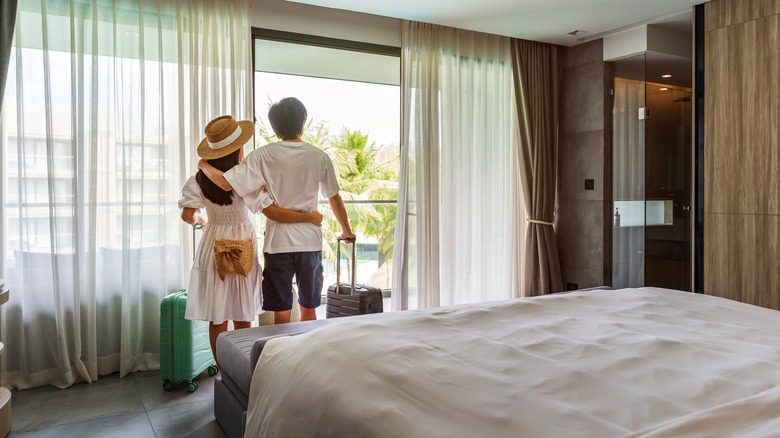Make Reserving Hotel Room Blocks For Your Wedding Easier With These Tips
When it comes to a wedding, arranging guest accommodations doesn't always fall squarely on the couple's shoulders, but it's a gesture of goodwill to offer assistance in finding a comfortable place for guests to stay after (or even before) the festivities. If your nuptials are only a short commute for most invitees, you don't have to feel obligated to fuss with lodging. But it's different if it's a destination wedding where your guests are investing time and miles to join your celebration. In that case, helping them find suitable dwellings becomes part of your hosting duties. The easiest way to do that? Book a hotel block.
Some couples opt to do a hotel buyout and reserve an entire hotel for their guests, but if that's not feasible, a hotel block is a more practical alternative. It's essentially a cluster of hotel rooms — usually a minimum of 10 — reserved for you and your guests at a lower price point of around 5 to 20% less than what is published. Whether you're footing the bill or politely passing it to your guests is your call.
Since reserving a hotel block isn't as straightforward as hopping online and booking a set number of rooms, you might be stumped as to how to approach the planning altogether. If you're finding the process daunting, here are several tips to help you navigate the planning phase efficiently, ensuring both you and your guests get the best value.
Choose hotels near the wedding venue and book far out in advance
When it comes to choosing hotels, one of the most important considerations is location. The goal is to avoid having your guests scramble to get to the wedding venue. It would be best to aim for a hotel within a 10-mile radius or at least within a comfortable stroll from transportation. A nice touch would be selecting one nestled among dining hotspots and attractions so your guests can turn their trip for your nuptials into a mini-vacation.
It also goes without saying that time is of the essence when arranging your hotel blocks, so try to secure your booking around six months before your wedding date, lest you want to run out of options. This is usually the case for weddings held in a relatively remote area with only a handful of accommodations available. Locking it down a year prior is even better, especially for popular dates or locations.
If the thought of booking a swath of hotel rooms breaks you out in a cold sweat, doing some number crunching can help ease those jitters. "Start by tallying up all the out-of-town guests and divide the number by half, given that most attendees will share a room [as] a couple or family," advised Octavia Watson, a group rooms coordinator, in an interview with Philadelphia Magazine. Just don't forget to include a buffer and add in a few extra rooms to accommodate any local guests who might want a crash pad after the festivities.
Know the difference between courtesy and guaranteed blocks
Wedding blocks are categorized in two categories: courtesy (or open) blocks and guaranteed (or closed) blocks. Courtesy blocks are a risk-free option where the hotel agrees to hold a set number of rooms for your guests until a specified deadline — usually 30 days before the big day. The appeal of this setup is that you're not financially responsible for any rooms that end up being unbooked. The kicker, however, is that after the cutoff date, the unsold rooms are released to the public at the usual going rate. Guests who drag their feet and miss the booking window will have no choice but to pay the regular room costs.
Meanwhile, a guaranteed block is a set of rooms that are held exclusively for your wedding party, locked in at a set price. The catch? You enter a contract where you agree to pick up the tab for any rooms that remain empty. The good news is that normally, the contracts have what is called an attrition rate clause, which specifies the percentage of rooms that can go unbooked without financial penalty to you. "If you have an attrition of 20% with a room block of 10 room nights, then really you are only financially responsible for 8 of them," Event Planner Keith Willard explained to Wedding Spot. "You want to make sure you have attrition. It's an item that most couples will miss because you don't know what you don't know." With this route, not only will you guarantee rooms for your guests, but you also get to offer flexibility for those making last-minute decisions.
See if you can book multiple hotels
If your wedding venue has numerous lodging options nearby, try and book multiple hotel blocks for your guests to offer variety. This approach caters to their varied budgets and preferences, ensuring everyone has a comfortable place to stay without feeling pressured to spend more than they have to. "I recommend two hotel blocks: one at a standard, familiar, hotel chain that is affordable for guests traveling to the area," Willa Dunn, an experienced wedding planner, told Bustle. "The second, if you want to offer a boutique or more curated option that reflects you as a couple or the city you're getting married in." She also suggests looking for hotels that provide added value to enhance your guests' overall experience. "Offer a place that includes breakfast or is close to the venue or other fun options for their trip," she added.
There's also a potential bonus to booking blocks at multiple hotels: complimentary offers. Some hotels throw in perks once a certain booking threshold is met, which you can use to your advantage. "Many hotels offer a free room or suite to the couple if they fill up their room block," wedding planner and photographer Thomas Beaman told Wedding Spot. "By getting a room block at a second or third hotel, you increase your chances of getting these same perks for parents or grandparents if those blocks fill up."
Don't hesitate to negotiate
While most room blocks are already offered at a discounted rate, one thing you should keep in mind is that there is always room for negotiation, allowing you to push for even greater savings. "Room block rates are always negotiable," founder of a wedding and honeymoon travel agency Pamela Strauss-Goldman told The New York Times. "Unfortunately, most couples don't negotiate because they don't know that they can."
One strategy is to inform hotels that you are shopping for the best rates right off the bat, thereby encouraging them to offer competitive rates to secure your business. This can lead to better offers, making it a win for you and your guests. Don't hesitate to mention specific rates proposed by your other options, as this can incentivize a hotel to match or even beat those offers. Remember, the worst they can do is say no.
If a hotel remains firm on its room rates, don't concede just yet — see if there are alternative avenues for savings. The hotel might still be open to offering perks such as complimentary parking or vouchers for meals and drinks at their in-house bar and dining facilities. Doing this ensures you're maximizing the benefits for your guests, even if the base room rate remains unchanged.
Make sure to do an in-person viewing
Photos and online reviews are great resources in painting a picture of what staying at a hotel might be like, but there's no substitute for experiencing it firsthand. This step is crucial, especially if you're also looking to use the hotel for pre-wedding preparations. "Does it have outlets in convenient locations? Is the lighting good? You want a room with really bright, ample light because that's going to provide the best lighting for not only makeup but also your photographer and videographer," Lauren Grech, founder of a wedding planning company, shared with The New York Times. "Also, look at how attentive the staff is. If I walk into a hotel and an employee hasn't approached me within five minutes, I'm concerned."
And while an overnight stay can be enough to gauge the essence of a hotel, wedding planner Darryl Moore recommends booking an extended visit so you can have a taste of what it's really like to be a guest there. "I would surely encourage couples to visit the destination at least once and give themselves two to three days [at the destination] if scheduling allows," he told Brides. "This is the perfect time for you to see and feel what your guests will feel and experience. If you can't make it, hire a professional who is great at details and communication."





